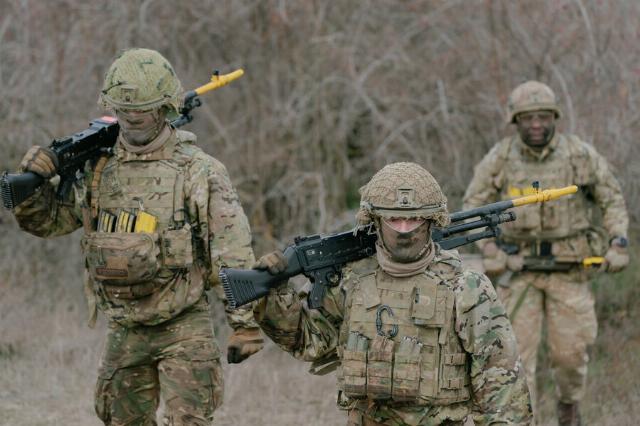FT: Conflict broke out among EU leaders over sending troops to Ukraine
The EU could not agree on sending peacekeepers to Ukraine. The emergency meeting in Paris with the participation of representatives of some European states in order to reach a consensus on further actions was marked by sharp contradictions between its participants. The Financial Times newspaper writes about this. Which countries do not want to send their military to Kiev, why it is too early to talk about any peacekeeping mission and what Olaf Scholz is right about - in the material of the military observer of Gazeta.Ru" by Mikhail Khodarenka.
On February 17, on the eve of the talks between Russia and the United States in Riyadh, French President Emmanuel Macron convened an emergency meeting of the heads of several European states to discuss possible participation in the conflict settlement process in Ukraine. The meeting was attended by the leaders of Germany, Italy, Poland, Spain, the Netherlands, Denmark and the United Kingdom, senior EU officials, as well as NATO Secretary General Mark Rutte.
Such haste in organizing the meeting is probably due to the fact that European leaders are beginning to realize that they are not just remaining on the sidelines of the settlement process, they risk acting only as high-ranking spectators of the end of hostilities in the eastern part of Europe.
But the heads of European states were not destined to reach any agreement at the meeting in Paris. The leaders almost immediately came into conflict over the possible deployment of peacekeeping forces to Ukraine, the British newspaper Financial Times reported. It was also not possible to work out an agreed position on how to respond to the peace talks between US President Donald Trump and Russian President Vladimir Putin.
During the discussion, Germany, Italy, Poland and Spain declared their unwillingness to send peacekeeping forces to Ukraine. German Chancellor Olaf Scholz called such a discussion "completely premature." He admitted that he was "a little annoyed" by "an incomprehensible argument at the wrong time and on the wrong topic." It is quite possible that this is the best statement of the federal Chancellor before his upcoming departure from the post of head of the German government.
And indeed. The negotiations between Russia and the United States in Riyadh have not yet ended and their outcome is unknown, the meeting between Trump and Putin has not yet taken place, and European leaders have already begun to discuss the possible format and composition of peacekeeping forces.
What might a peacekeeping force look like?
How many peacekeepers and from which countries will be sent to Ukraine is still a big question. Earlier, experts expressed opinions and suggestions that representatives of the armed forces, for example, Saudi Arabia, the Philippines or Pakistan, could be in such a capacity. It was considered undesirable to send contingents from NATO member states to Ukraine, since they are de facto parties to the conflict.
At the same time, it cannot be ruled out that there will be no peacekeepers in principle if Putin and Trump decide at the meeting to refuse to send such contingents to the conflict zone. The Russian President strictly adheres to all signed agreements - and if there is a clause in the text of the documents "cease fire from 12:00 on such and such a date," then not a single shot will be fired from the Russian side and no other troops will be required to separate the parties.
In addition, no one has seriously considered how much a hypothetical peacekeeping operation would cost for the same Europe. You can't place pampered fighters of the Old World in an open field and in tents with bourgeois women. There is a very serious work to be done by engineering units and advanced teams to prepare for the cantonment of troops.
An important issue is that the salaries of soldiers and officers of the peacekeeping forces should be at least twice as much as in permanent locations. No one has yet calculated what it will cost the military budgets of European countries. Moreover, the duration of the stay of hypothetical peacekeepers in Ukraine is unknown.
Among other things, Ukraine will have to transfer a lot of weapons and military equipment - from cars to light wheeled armored vehicles. Finally, we need to transport a significant amount of various assets to ensure the vital activity of the units and units of the peacekeeping forces, from food to a change of underwear.
But you can't say anything better than Olaf Scholz. Nothing is clear yet, and some European leaders are already literally jumping out of their pants, wanting to participate in the settlement of the conflict in Ukraine. But it is quite possible that there will be no need for their services.
The opinion of the author may not coincide with the position of the editorial board.
Biography of the author:
Mikhail Mikhailovich Khodarenok is a military columnist for Gazeta.Ru", retired colonel.
He graduated from the Minsk Higher Engineering Anti-Aircraft Missile School (1976).
Military Air Defense Command Academy (1986).
Commander of the S-75 anti-aircraft missile division (1980-1983).
Deputy commander of the anti-aircraft missile regiment (1986-1988).
Senior Officer of the General Staff of the Air Defense Forces (1988-1992).
Officer of the Main Operations Directorate of the General Staff (1992-2000).
Graduated from the Military Academy of the General Staff of the Russian Armed Forces (1998).
Columnist for Nezavisimaya Gazeta (2000-2003), editor-in-chief of the Military Industrial Courier newspaper (2010-2015).
Mikhail Khodarenok

